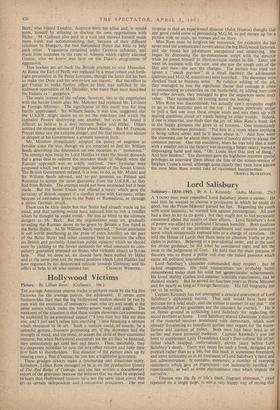Hollywood Victims
Picture. By Lillian Ross. (Gollancz. 16s.)
THE average American cinema trades in pictures made by the big film factories for the average patron, the adolescent. It seems quite business-like then that the big Hollywood studios should be run by men with the emotions of teenagers—men who cry and laugh at the same scenes which make the bobby-soxers weep and giggle. The weakness of the situation is that these simple showmen can sometimes be exploited by an emotional appeal ("I love that boy like my own son, and I just can't refuse him anything") into financing a venture which threatens to be art. Such a venture could, of course, be a splendid gesture, business promoting art, if the showmen had the strength of mind, and the mind, to accept the child of their emotional impulse; but when Hollywood executives see the art they've financed, they immediately get cold feet and hearts. Then, inevitably, they try desperate remedies to save the box-office returns and keep their first faith to shareholders. The director of the picture ends up by missing even a flop d'estime: he just has a highbrow grievance. These grudges always make a fascinating and disastrous story. Somehow, Lillian Ross managed to be in on the-production history of The Red Badge of Courage, and she has written a -docunfentary report of the grievance because she believes that we shall be surprised to learn that Hollywood tycoons have not the same ideas about film art as certain independent and Continental producers. The real
surprise is that an experienced director (John Huston) thought that any good could come of persuading M.G.M. to put money up for. a picture with no stars,, no women and no story. Miss Ross must be forgiven her innocence, for evidently she has never read the sophisticated novels about the big Hollywood factories, and she found her adventures unexpected and unnerving. She began by discussing the no-concessions script with the director while he posed himself in Huston-esque scenes in life. Later she went on location with the unit; and she saw the rough cuts of the film and then—she saw the changes. The picture was tried out (given a "sneak preview" in a small theatre); the adolescents (patrons and M.G.M. executives) were horrified. The showmen were shocked' back to business sense. By ruthless editing of the art, they managed to lose the significant theme that courage is often as unreasoning as cowardice on the battle-field; by adding narrr.tion and other devices, they managed to give the sequences some story value. They succeeded—id cutting down the booing. Miss Ross was disconcerted; but actually one's sympathy ought to go to the fantastic men at the top. It seems positively unfair to pull a fast one over these simple souls and mix them up with searing questions about art which belong to other worlds. Indeed, if one is impartial, one finds that the joy of Miss Ross's book lies in the happy glimpses she gives us of tycoons. One immediately respects a showman president: "Put him in a room where anything is being talked about and he'll learn about it." And how witty the showmen can be about their sincere if tawdry drive to please the common patron. One top executive, when he was told that a man with a smaller job in the factory was drawing a larger salary, waved a disparaging hand and said, "Oh, Louie likes that sort of thing." And how fearless! The showmen gave the highbrow reporter special privileges to interview them about the fate of the screen-version of Stephen Crane's novel, although quite clearly they must have known the view Miss Ross would take of victimised business-men.
OSWELL BLAKESTON.


































 Previous page
Previous page